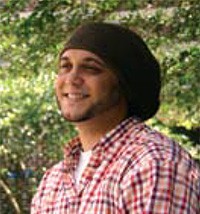
While the majority of students who enter the MSW program choose children and youth in families and society as their practice area, their interests vary from there. Some wish to work in school social work, others in foster care and adoption programs. Some complete field placements in family services and parent support programs, others in community organization.
Brian Babb and Laura Norton-Cruz have gained a vision to work with abused children.
Compassionate with a Capital C
“Brian Babb is compassionate with a capital C,” says Leigh Robertson, lecturer and field liaison.
Brian, an MSW student, gives credit to his family. “My mother and grandmother have a lot to do with my need to express compassion and empathy toward others.”
Brian feels a pull towards a mixture of macro and micro practice. As an undergrad at U-M, he learned skills in community organizing as a member of the Students of Color Coalition. As a resident advisor, he learned interpersonal skills. “It was nourishing for me. I knew I wanted to work with people within the successes and struggles of their day-to-day life.”
Brian’s field placement is with the Family Assessment Clinic (FAC), a multidisciplinary team in Ann Arbor that provides community services by evaluating and treating situations involving possible or actual child maltreatment. Professor Kathleen Coulborn Faller, director, wrote the original grant proposal for the FAC in 1985. The FAC team consists of faculty, doctoral and master’s students, and staff from the Schools of Social Work, Law, Medicine, and Education, as well as the Departments of Pediatrics, Psychiatry, and Psychology. The FAC serves as a context for developing knowledge and skills about child maltreatment, child welfare, and related issues through clinical practice and research.
At his field placement, Brian assesses and provides therapy to children and youth who have experienced physical, emotional, and sexual abuse. He realizes that he is one part of the larger picture. “All of the youth I see have worked within themselves before I get there.” He tells them, “Bring what work you’ve done and are doing, and let’s work together.”
Brian wants to continue doing child welfare work when he graduates. Eventually he would like to be involved in advocacy in his hometown of San Diego and perhaps teach social work at the community college and/or college level.
The resilience he sees in those who have been abused inspires him. “Despite having gone through very traumatic and tragic experiences, all of the children I’ve ever worked with still insist on being children. Honor the resilience you see, and it will enrich and nourish you.”
Preventing and Healing from Violence
Even before she knew what a master of social work was, Laura Norton-Cruz had decided that she wanted to work to prevent—and help young people heal from— interpersonal violence. While still a teenager, she volunteered with Intermission Crisis Nursery, a temporary shelter for abused children, in her hometown of Anchorage, Alaska.
After earning an undergraduate degree in critical social thought, she taught elementary school in East Palo Alto, California, as a Teach For America corps member. The challenge of teaching a class of students with behavioral issues and varying grade-level proficiencies “made it all the more evident that I needed to work with kids and that I had a lot more to learn.”
Laura returned to Anchorage—“I was homesick,” she says—and worked for Standing Together Against Rape, helping to define sexual assault for teenagers and teaching day care workers, priests, teachers, and even bartenders how to talk about sexual assault.
At the U-M School of Social Work, Laura’s field placement is with the Detroit Initiative, where she does process and outcome evaluations for various community organizations in Detroit. She also works with undergraduates to create and implement health and safety programs for children at Latino Family Services.
A class in poverty and inequality through the U-M SSW program inspired Laura to consider getting a PhD once she has earned her MSW. “The high level of thinking and analysis,” she says of the class, “made me so excited about the possibilities within research.” Her goal would be to take part in community-based participatory research—research “that is in itself intervention.”
—Tanya C. Hart Emley is editor of Ongoing. Jane E. Martin is assistant editor at the School of Social Work.